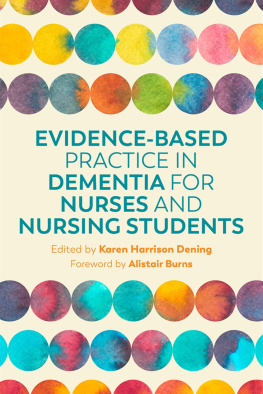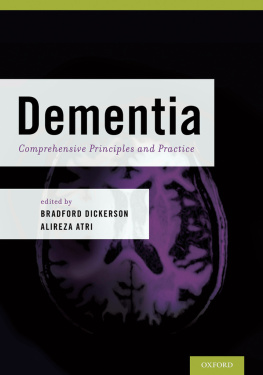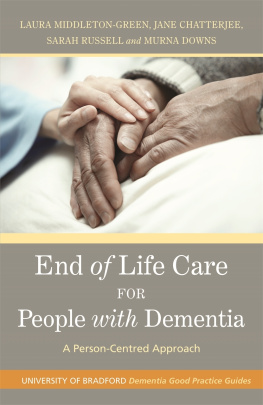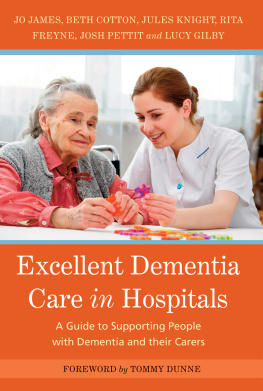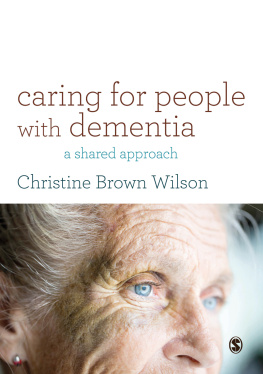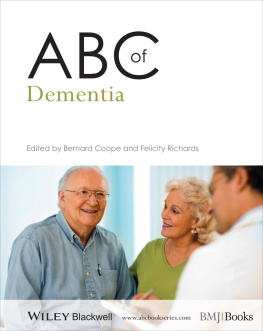
EVIDENCE-BASED
PRACTICE IN
DEMENTIA FOR
NURSES AND
NURSING STUDENTS
Edited by Karen Harrison Dening
Foreword by Alistair Burns

Jessica Kingsley Publishers
London and Philadelphia
Contents
Foreword
Dementia is one of the major health and social care challenges across the world affecting 47 million people worldwide. By 2050, the number is expected to exceed 130 million. This increase is partly to do with the ageing population but also probably to do with improved recognition, treatment and care of people.
The costs are highly significant 26 billion in the UK with a global cost of approaching 820 billion US dollars. The majority of costs are related to family and social support rather than strictly medical care. Dementia is an umbrella term which has a number of competing causes, the commonest of which are Alzheimers disease and vascular dementia, a combination of these and dementia with Lewy bodies.
Currently, there are no restorative treatments for the main cognitive symptoms but symptomatic treatments are available. Support in a persons own community is key, bearing in mind that the majority of the experience of people with dementia and their families is in their own communities rather than in the health system.
In the UK there have been a number of initiatives to improve the care of people with dementia including increasing the diagnosis rate and shining a light on the prescription of antipsychotic drugs for people with dementia which have been associated with an increased death rate and also the provision of high-quality post diagnostic support. Dementia is now the leading cause of death in England so end-of-life care is most important.
This book reflects the relevance of dementia. Experts in the field have considered carefully the evidence base and the improvement in knowledge that is needed in particular fields and have committed that to paper. The layout is pleasing and appropriate in that there is a challenge to the reader to stop and reflect after delving into a particular subject. Case studies abound which increase and enhance the learning opportunity. So, rather than just being a way of portraying information, the interaction with the reader is emphasised.
Karen Harrison Dening has done a superb job in structuring the chapters around diagnosis of dementia, person-centred care, the physical aspects of the condition and dementia in contexts and settings.
There is much to learn about particular areas, for example, about younger people with dementia, people with a learning disability, and dementia in particular ethnic groups are described. There are a number of challenges around person-centred care and a very poignant description of the malignant social psychology around dementia and changing that into positive person centred work. The importance of behavioural aspects of dementia and their appropriate treatment is well placed, as well as an excellent review on some of the ethical issues of caring for people with dementia.
The importance of correct diagnosis and an excellent summary of the differential diagnosis is given, which sets the scene. The rightful place of end-of-life care and advance care planning is summarised by the editor and all importantly the ways to support people with dementia and their families are emphasised. We are reminded of the comorbid issues of delirium and dementia and pain in dementia. The book finishes off with a great summary of the care of people with dementia in the community, in the hospital and in care homes.
In recent years it is difficult to imagine how we would ever go back to the malignant psychology which for so long dominated issues around the care of people with the condition and their families. While a treatment is potentially a number of years away, the importance of what we can do now is summarised in this excellent contribution.
The Editor and all the contributors are to be congratulated at a significant addition to the armamentarium of literature on this most important of subjects. Everyone involved in dementia care would benefit from dipping into and being challenged by it.
Professor Alistair Burns
Professor of Old Age Psychiatry
University of Manchester
Preface
Welcome to this book! The book was an inspiration following the publication of a very successful series of articles on dementia that ran in a well-known nursing journal between 2015 and 2017, which included 30 individual papers in all. Gwen Clarke (a former section editor for the journal) approached me and invited me to plan, commission and co-edit on a range of issues and topics on dementia and care for people affected by dementia. The series was one of the longest-running and most successful of all the condition-related series the journal had run. It coincided and responded to the call for improved care of people with dementia and their families in several national policy and guidance documents.
Dementia care has changed massively on many levels since my days as a student nurse, including such things as: the Kitwoodian approach to person-centred care, the setting and range of services, education, technology, validation and revalidation of professional registrationsneed I go on? As one moves through ones career, reflecting on practice and knowledge, we may sometimes find ourselves saying If only I knew then what I know now then where would we be today? What resources might we have benefited from during our years of training and then as an early career nurse? We may have highly valued a book such as this that introduces the knowledge we need, the evidence base for practice but which also gives the guidance to transfer this newly acquired knowledge into everyday practice.
Structure and content of the book
Each of the 25 chapters is written by experts in the field of dementia care who have approached their chapter by combining all of these essential elements: introducing the knowledge and evidence base related to their subject, discussing this through the use of case studies and then asking the reader to stop and reflect and apply this new knowledge to their current practice setting. The authors cannot fit all they know into a brief chapter but they can use their respective expertise and knowledge to set the context to caring for people with dementia and their family carers. I have tried to loosely structure the chapters to a section about dementia, a section detailing person-centred dementia care, a section on the physical aspects of dementia such as co-morbid conditions and a final section about dementia care in different contexts and settings.
) is an emerging field of specialist practice with its presentation perhaps seeming atypical by comparison to dementia in a non-learning disability population. However, people with learning disability access all broad-stream health and social care, so an understanding of dementia in this population is essential.
The central section of the book deals with various principles that underpin dementia care. In by examining the principles of effective communication. When conversing with a person with dementia we are told it may be easy to focus on directly answering the question someone asks; however, whilst the answers we give are not intended to cause distress, we may be in danger of unintentionally ignoring the psychological needs of the person with dementia. This chapter gives many useful suggestions, scripting and examples of good communication in care.
and apply it to some complex situations that often arise in dementia care, especially in communal living settings.
) underpin all care but have significant meaning in dementia care where a person loses the ability to speak and advocate for themselves. Ethics is about doing the right thing; the authors tell us that its not just about doing the right thing technically, for example making sure youve given the correct dose of medication; its about making sure that youve done things in accordance with the underlying moral principles. It is difficult, sequentially, to see at what stage in the text such a chapter might appear. However, wherever this were to be placed, its contents would resonate and underpin all other work in the book.
Next page
